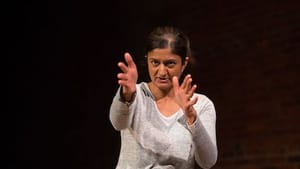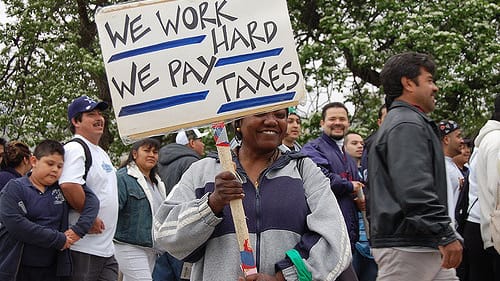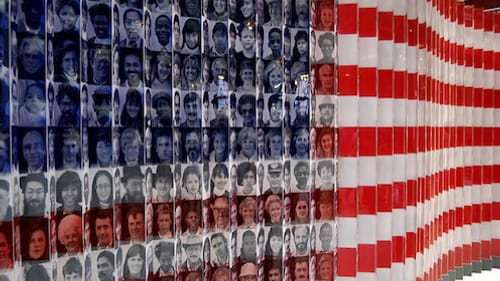Stay in the Loop
BSR publishes on a weekly schedule, with an email newsletter every Wednesday and Thursday morning. There’s no paywall, and subscribing is always free.
Undocumented, unafraid
First Person Arts presents Nimisha Ladva's 'Uninvited Girl: An Immigrant Story'

The scrolling red digital banner wrapped around the Fox 29 building provided an apt epilogue for the First Person Arts Festival’s (FPA) Uninvited Girl: An Immigrant Story. It said our mayor wanted us to watch out for acts of bigotry, but remain calm following Donald Trump’s presidential election win.
A global education
That tension between the reality of a painful, precarious social status for many U.S. residents and the faith we place in our government institutions was a theme in writer/performer Nimisha Ladva’s one-woman show. It’s also something those frightened by the implications of Trump’s election must wrestle with.
“I’m an undocumented immigrant, and I want you to arrest me,” Ladva begins, in one of the most entertaining and compelling solo shows I’ve seen, staged with subtle but effective sound and lighting, and a single chair for scenery. Ladva, the FPA fest’s 2014 Grand Slam winner, a Leeway Foundation Art for Change grant recipient, and a visiting assistant professor of writing at Haverford College, was born to Indian parents in Kenya, grew up in England, and came to California with her family as a teenager.
Her show, directed by Edward Sobel, follows her life story. Racism in her elementary school classroom leaves a deep mark when a teacher says that despite young Ladva’s top grades, she’ll never meet tacit “additional requirements” for an elite student group. Textured by the voices and viewpoints of many characters who speak to her, Ladva’s tale reveals that she is the child of storytellers, though her parents are wary when she begs permission to act in a high school production of Midsummer Night’s Dream. “I don’t understand how you heard the right stories and got the wrong ideas!” her mother exclaims. She’s afraid the audience won’t see an Indian girl doing Shakespeare; they’ll see “an Indian girl trying to be white.”
When aliens are neighbors

Her family was all born outside the United States except for her youngest brother, a U.S. citizen. They run a restaurant, pay taxes, and renew business visas each year, though they also want to become citizens. But when Ladva is an honor student at UCLA, a bizarre bureaucratic action denies them a renewed visa, and as Ladva puts it, “with a smile and a handshake, we become undocumented immigrants.”
It’s an important moment in the story, recasting the often-demonized “illegal alien” simply as a person caught in the shoals of our confusing and fickle immigration policies.
Things look desperate as the family faces deportation after years of building a community and a career here. Their immigration lawyer says they must throw themselves on the mercy of the system that failed them: turn themselves in as undocumented immigrants, await a pre-deportation court hearing guaranteed by law, and make a last-ditch case for U.S. residency. By the time their hearing arrives, the family has gathered so many supporters of all colors, faiths, and political bents, including friends, customers, and employees (“Americans all”) that the courtroom has a carnival atmosphere. But the judge they receive is notorious for peremptory rulings against immigrants, and refuses to even hear from their lawyer.
The final scene marks a high note and a happy ending to Ladva’s Uninvited Girl sojourn, won in part through the support and testimony of their adopted U.S. community. It’s a hopeful conclusion to a story with dark currents that resonate particularly strongly right now.
Looking forward

In the U.S., Ladva’s mother warns, when an Indian girl goes too far outside her own family and culture, “when times change and they’re looking for someone to blame, they will spit on you.”
Though Ladva’s family’s story is ultimately happy, it’s sobering, too. They have no choice but to gamble their lives in the same system that threatened to expel them without cause, trusting that system to practice the values it claims to hold. In Ladva’s telling, it all hung on the words of one principled prosecutor, who could have kept quiet and sent the family packing, instead of speaking up for due process.
As I watched the letters scroll on that Fox 29 building, Ladva’s dilemma felt very relevant. However much many of us fear the racism, misogyny, homophobia, Islamophobia, and anti-Semitism that seeped through the Trump campaign and its supporters, and Trump’s many unconstitutional threats, we hear from some that our government institutions are stronger than a Trump administration, and we’ll come out intact on the other side as the nation we still want to be.
So maybe we can all relate to Ladva in the courtroom — forced to trust in the workings of government to save us when we face dangerously prejudiced people in positions of power.
Hate crimes related to the presidential election are happening in our city, the Mayor acknowledges. Swastikas were painted a few blocks from my South Philly house and Penn students were threatened with lynching. But we should stay vigilant and calm.
Ladva’s story ends in a multicultural jubilee. I’m glad it did. I’m less optimistic for the country that is home to both of us.
What, When, Where
Uninvited Girl: An Immigrant Story. By Nimisha Ladva. Edward Sobel directed. November 15, 2016 at the Christ Church Neighborhood House Theatre, 20 N. American Street, Philadelphia. Firstpersonarts.org.
Sign up for our newsletter
All of the week's new articles, all in one place. Sign up for the free weekly BSR newsletters, and don't miss a conversation.
 Alaina Johns
Alaina Johns